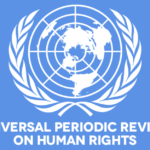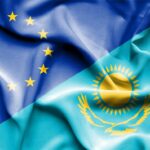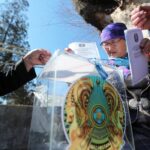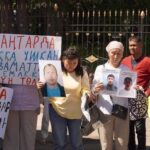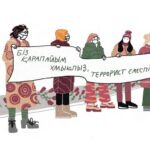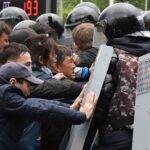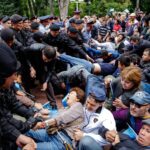KAZAKHSTAN
Submission to the UN Universal Periodic Review
20TH Session of the UPR Working Group
Submitted 15 MARCH 2014
Joint Submission[1] by:
Public Fund “Kazakhstan Parliamentary development Fund” – non-governmental organization operating to enhance the role and effectiveness of the RK Parliament and local Authorities by increasing and improving public participation in the functioning process
Address: office 413E, 19, Imanova str., Business House “Almaty “, 010000, Astana
Confederation of Free Trade Unions of Kazakhstan promotes establishment and integration of free trade unions and associations for protection of professional, labor and socio-economic rights and interests of its members
Address: 73, Zhandosova str., 160000, Shymkent www.kspk.org
Non-governmental institution “Eco Mangistau” promotes improvement of ecological and social-economic life conditions, environment and saving its resources for future generations by ecological education of citizens, development of civil activity, conducting different events
Address: Suite 15, Building 88, Micro District 3, 130000, Aktau, e-mail: info@ecomangystau.kz
Association of legal entities “Union of Crisis Centers in Kazakhstan” provides activities aimed at prevention of all forms of gender violence and forming culture of non-violence relation in society
Address: app.2, bld.9, Koktem-1, 050040, Almaty, www.telefon150.kz
Public Association “Feminist League” – operates to promote gender equality in the economic, political, social, and cultural life of the country; has special consultative status with the ECOSOC.
Address: 23-32, Abai ave., 050010 , Almaty, e-mail: kazfemline@gmail.com, www.women.kz
Public Association “Women Support Center” – working for elimination of gender discrimination, raising public awareness on gender relations issues, protection and realization of women and children human
Address: 61, Teatralnaya str., 150000, Petropavlovsk
Public Fund “Children Fund of Kazakhstan” – operates for strengthening protection of children’s rights and interests, and charity
Address: office 4, 85, Karasai Batyr str., 050000, Almaty
Corporate Fund «SOS Children Villages – Kazakhstan” – promotes children’s rights protection system in Kazakhstan through improving practice in providing assistance to orphans and children in need.
Address: office 13, Micro District Samal, 010000, Astana
Public Foundation “Aman Saulyk” promotes development of the civil society and improving quality of life in Kazakhstan through promoting democratic principles and implementation of the right to health and social protection Address: 23A, Tole Bi str., 050000, Almaty, e-mail: amansaulyk@mail.ru
Public Association of disabled persons with higher education Namys – involves disabled persons and their organizations in the process of promoting their interests, provides monitoring and evaluation of Governments’ social programs; create and support information networks.
Address: 69, Zhandosova str., Almaty, e-mail: namys@bk.ru
SOCIAIL AND ECONOMIC RIGHTS AND RIGHTS OF VULNERABLE GROUPS
I. The right to adequate housing
II. Trade unions
III. The right to environment
IV. Rights of Women
V. Rights of the child
VI. Disability Rights
VII. Rights of migrants, refugees and stateless persons
VIII. The right to freedom of movement and choice of residence
IX. Trafficking.
I. THE RIGHT TO ADEQUATE HOUSING
1. Kazakhstan legislation does not have the required international standards of legal prohibition and protection against forced evictions. There is no definition of “forced eviction” and no recognition of the right not to be forcibly evicted. The national law allows for forced evictions without alternative accommodation.
2. The government is not taking any measures to implement the right to adequate housing and protection against eviction orders of banks in cases of failed mortgages. There were numerous cases of suicides of people who faced forced eviction orders. There has been no response from the government to address this problem. No freeze on eviction orders has been implemented to provide some relief to the population under extreme hardships.
3. There is no reliable and consolidated statistics on forced evictions in the country. There are no provisions to ensure strict control over the procedures of eviction. There are no mechanisms to bring to justice persons who commit violations in the process of evictions.
4. NGOs are alarmed of the growing trend of housing rights violations in the country. People are being evicted from their own homes and appropriated private lands and houses without adequate compensation to ensure alternative accommodation. The government program to provide housing to socially vulnerable groups is not effective, as people have to queue for decades to get some form of housing.
Recommendations:
· Adopt legislative measures to guarantee the right to adequate housing and to establish safeguards against forced evictions for home and land owners;
· Take measures to address the problem of suicides of persons being forcefully evicted.
· Establish an effective system and mechanisms to implement the right to adequate housing in practice, including strict control over the conditions under which evictions are carried out;
· Establish a single responsible government authority to protect the right to adequate housing, monitor the practice of evictions and take measures to protect citizens in cases of extreme hardships.
II. TRADE UNIONS
5. The government continues the practice of impeding the activities of independent trade unions. It is expressed in the form of denial of state registration of independent trade unions, dismissal and prosecution of trade union leaders, violation or termination of collective agreements, etc. For instance, Almaty City Department of Justice refused registration of the independent trade union of journalists “Mass-Media PR” on 19 June, 2012, under formal pretext.
6. Anti-trade union tactics target not only leaders but also all members. For instance, LLP SAS Tobe Technologies in the South Kazakhstan region does not recognize an independent trade union in the construction industry. The union members have become targets of various methods of pressure, such as: transfers, wage cuts, career demotion, etc.
7. Labor inspectors and prosecutors take the side of the employer and ignore the obvious violations of the legislation, failing to take any actions. Recently, there have been frequent cases of prosecutors taking criminal actions against the leaders of trade union. They use the Article 164 of the Criminal Code on “Incitement of social, national, ethnic, racial or religious hatred” against union leaders for mobilizing workers and organizing strikes. For example, in 2011 the union lawyer at “Karazhan Bas Munay”, Natalia Sokolova, was sentenced to six years in prison on charges of inciting social discord. Such prosecution of union leaders for the exercise of their professional duties is unacceptable and is considered as political persecution of independent trade unions.
8. Currently, the government developed and sent to the Parliament the draft law “On Trade Unions” and “On amendments and additions to some legislative acts of the Republic of Kazakhstan on the activities of trade unions and labor relations”. These bills were prepared by the Ministry of Labor without consultation with the public and independent trade unions. It is contrary to the ILO Convention concerning Freedom of Association and Protection of the Right to Organize, ratified by Kazakhstan.
9. International Labor Office prepared “Memorandum of technical comments on the draft Law on Trade Unions of the Republic of Kazakhstan”, which highlighted the shortcomings of the government’s proposals. Thus, in accordance with ILO Convention, trade unions should be free to form and join to any labor organizations such as federations or confederations. The current draft law, however, establishes conditions for monopolization of unions under government control, leaving no space for existence of independent trade unions.
10. The government policy of repression and strict regulation of the independent trade union movement is also reflected in the draft Criminal Code of the Republic of Kazakhstan, which is currently in the Parliament. In particular, the Article 400 of the Draft Criminal Code criminalizes actions that provoke continuous participation in the strike, which has been recognized as unlawful by the court. Punishment includes restricting liberty for up to one year, or imprisonment for the same term. If such actions have resulted in substantial harm to the rights and legitimate interests of citizens or organizations, punishment by imprisonment goes up to three years. Given the lack of independent judiciary in the country, any strike could potentially be declared unlawful. In such circumstances, this new provision is repressive in nature and is aimed at intimidating the leaders of independent trade unions.
Recommendations:
· End practice of denial of state registration to independent trade unions and take measures to implement obligations under the ILO Convention (87).
· Introduce strict liability for interfering in trade union activities and dismissal of union leaders, as well as discrimination based on trade union membership.
· Put an end to practice of prosecutions of trade union leaders for the exercise of their professional duties. Ensure that trade union activities are not qualified as social discord under the Article 164 of the Criminal Code.
· Ensure that the Draft laws “On Trade Unions” and “On amendments and additions to some legislative acts of the Republic of Kazakhstan on the activities of trade unions and labor relations” undergo public discussion with participation of all national stake holders and international experts from ILO and ITUC to ensure its compliance with international labor standards.
· Revoke criminalization of trade union activities and labor strikes from the Draft Criminal Code of Kazakhstan.
III. THE RIGHT TO ENVIRONMENT
11. Since the first UPR report, the situation in Kazakhstan on the exercise of the right to environment has not changed significantly. There is no right to environment in the Constitution of the Republic of Kazakhstan. It reflects only the fact that the state seeks to protect the environment that is conducive to human life and health (Article 31), but it does not confer such a right to all citizens. In this regard, Kazakhstan citizens are not able to effectively claim their right to freedom from pollution, environmental degradation and activities that adversely affect the environment, health, livelihood and well-being.
12. Among the main reasons for massive violations of the right to environment are: lack of state environmental policy, over-exploitation of natural resources, the collapse of the state system of environmental protection, non-compliance with international and national laws, lack of civilian oversight, as well as systemic corruption.
13. The legislation has no proper mechanism for public participation in the process of decision-making on environmental issues. Despite the adoption of the new Rules № 50 on Public Hearings as of 26.03.13, contributions from civil society organizations are treated as recommendations and have no weight in the final decision.
14. One of the obstacles to public participation in decision-making on environment issues is the fact that major decisions are taken at the stage of government strategic planning, i.e. long before the environment review.
15. There is no law regulating public access to government held data including on environmental issues. The litigation on environmental issues in the courts demonstrates the lack of effective remedies. There is no uniform interpretation and application of environmental legislation by the courts in civil cases.
Recommendations:
· Ensure full implementation of the Convention of the UNECE “On access to information , public participation in decision-making and Access to Justice in Environmental Matters ” (Aarhus Convention).
· Bring Kazakhstan legislation in accordance with international standards in the field of environmental protection.
· Take measures to provide access to government held information on environmental issues.
IV. RIGHTS OF WOMEN
16. Recommendations of the first cycle of the UPR to protect the rights of women in Kazakhstan have been implemented fragmentary. Representation of women at decision-making levels remains low. No activities are foreseen to set up temporary or long –term policies to improve representation of women in decision-making posts.
17. Gender Equality Strategy of Kazakhstan for 2006-2016 contains clearly insufficient measures to increase women’s political representation. For instance it is planned only to “explore” the issue of quotas for the next 10 years.
18. According to official statistics, women’s wages on average make up 60-64 % of men’s wages. Disproportionate remuneration negatively affects social status of women, especially single-parent families. At present in Kazakhstan 30% of children grow up in single-parent families and only 16 % of divorced men pay child support.
19. Kazakhstan legislation does not prohibit sexual harassment. There is no such crime in the criminal law. Liability for sexual harassment is stipulated only in the law on domestic violence and equality.
20. There are several alarming trends evident from the analysis of statistical data on gender indicators, such as: high level of income inequality between men and women, long-term unemployment among women, increase of the retirement age for women, reduction of benefits for pregnancy, childbirth and maintenance.
21. In Kazakhstan, there is a high level of domestic violence against women. For example, in 2012, Mangystau region recorded 3,117 complaints and allegations of illegal acts against women, while in 2011 it was 2,864.[2]
22. Local authorities are not willing to allocate funds for setting up effective mechanisms to protect women from violence. The government has not developed any standards for the provision of social services to victims of domestic violence. The Law “On Prevention of Domestic Violence” provides a protection measure only in the form of a protective order, but it is difficult to trace its execution. For instance, in 2012, 722 persons were held administratively liable for violating such protective orders; in 2013 it was more than 1000.[3] Such trend supports the argument that the protective orders are not effective measures to ensure women’s safety and security.
23. Victims of domestic violence mostly receive help from specialized crisis centers, established by NGOs. In 2013, the specialists of such crisis centers provided 9 thousand consultations, as well as legal, psychological and social assistance to 20 thousand women.[4] There is no funding assistance from the government to ensure sustainability of such centers and the support they provide.
Recommendations:
· Develop effective legislative and practical mechanisms to ensure equal representation of women in political structures and decision-making places at all levels.
· Take legislative and administrative measures to effectively prevent and protect women from sexual harassment in all spheres of social life, including work place.
· Develop and endorse standards of social services for victims of domestic violence.
· Support through public funding establishment and functioning of crisis centers and shelters for women in all regional centers of Kazakhstan.
V. RIGHTS OF THE CHILD
24. The government adopted the Action Plan on the Implementation of the UPR Recommendations for 2011 – 2014, which included most of the recommendations by the member states of the UNHRC. While this is a positive step, the Action Plan fails to become an effective policy instrument. It is broadly defined, lacks specific measures and envisages no government funding for proposed activities. Some issues were not included in the plan, such as implementing the right to secondary education for children from families of socially vulnerable groups, including children with disabilities.
25. The problem of housing for children from poor families, orphans and children left without parental care continues to be acute. According to the Ministry of Education out of 34 thousand orphans, 27 thousand are in need of housing. Since 2006, out 14,000 graduates of orphanages only 849 (or 6 %) have some sort of housing.
26. No policies on equal opportunities are adopted and implemented in the practice of government agencies. In the areas of access to education and health care, there continues to be discrimination against children from rural areas and areas of ecological disaster. NGO monitoring of law-enforcement practices for the period 2010-2013 identified violations of children’s rights from four categories: refugees and migrants, children with special needs, children with behavioral problems and children from low-income families in the areas of access to quality education, health care, correctional and rehabilitation programs.
27. In 2013, many children of migrants were unable to receive free textbooks and free meal plans due to lack of registration of personal identification numbers. Roma children are in particularly disadvantaged position due to lack of permanent housing and subsequent registration documents for parents.[5] As a result, some Roma parents are forced to register their children on the names of relatives or even neighbors. Many children do not have birth certificates and Individual Identification Number. Because of persisting problems with documents, Roma families are not eligible for state’s social support, including free healthcare.
28. In Kazakhstan, there are only two boarding schools for blind children in the cities of Almaty and Karaganda. Due to large demand they are overcrowded and cannot accommodate all children in need from other regions of the country.
29. The problem of safety standards with blood transfusions continues to be poorly addressed by the government. Despite numerous appeals of parents, whose children suffered from contaminated blood transfusions, as well as NGOs and the media, there have been no revision of sanitary standards in institutions for treatment and preparation of donor blood for child patients. No measures are put in place to guarantee safety from infection with deadly diseases. Increase in the number of infected children with little chance of recovery makes this problem a national tragedy.
30. There is a problem of early and forced marriages in the country. Annually in Kazakhstan there are about 3 thousand marriages with minors. Neither the Criminal Code nor the Code of Administrative Offences provides liability for practice of forced marriages, which reflects a “hands off” approach by the state.
31. Number of suicides among children in Kazakhstan continues to grow. According to the Committee on Legal Statistics of the General Prosecutor’s Office there were 237 cases of suicide registered in 2010, in 2011 – 257 and 592 suicide attempts. There is no comprehensive and systematic approach to address the problem of children’s suicide.
32. There have been cases of violation of Article 9 “Separation from parents” of the UN Convention on the Rights of the Child. There is a practice of removing parental rights due lack of homes, financial and economic hardships, which is contrary the international standards, as poverty can not be the main reason for the child’s separation from parents. In 2010, Astana courts deprived 22 parents of parental rights, which is 7 cases more than in 2009.
33. The government has not set up the Special Commissioner for Children’s Rights despite calls of civil society and recommendations of international bodies. Absence of such an oversight, as well as the abolition of the Departments for the Protection of Children’s Rights at the local level weaken the protection of children’s rights and does not allow for regular public monitoring of compliance with the rights of children.
Recommendations:
· Establish the office of the Ombudsman for Rights of the Child in order to effectively promote and protect children’s rights.
· Sign and ratify the Third Optional Protocol to the Convention on the Rights of the Child. Carry out ongoing monitoring on the use of child labor. Develop a program to protect children of non- citizens of Kazakhstan.
· Develop effective programs to prevent children from being placed to institutional forms of care.
VI. DISABILITY RIGHTS
34. UPR recommendations to Kazakhstan on disability are implemented partially. Currently, Kazakhstan has adopted and implemented the Action Plan to promote the rights and improve the quality of life of persons with disabilities for 2012 – 2018. The first phase of the plan was approved in 2012 and is currently under implementation. The activities in the first phase are aimed at improving the existing legislation to protect the rights, freedoms and interests of persons with disabilities and assessment of the accessibility of facilities and services in key areas of social life.
35. The implementation occurs in three directions. First, the methodology for certification of social infrastructures for the availability and use by persons of all types of disabilities is approved. At present, the government is conducting certification in all 16 regions of Kazakhstan. Assessment of the amount of funding and practical measures necessary to change the social infrastructures in the regions to ensure accessibility for the disabled is in process.
36. Second, with the active participation of disability NGOs the proposal on the amendment of 32 legislation acts to comply with the Convention on the Rights of Persons with Disabilities was developed and submitted for approval by ministries.
37. Third, the government adopted a national and 16 regional media plans to improve public attitudes and treatment of the disabled, change social stigma and stereotypes and raise awareness of their rights. The government established the office of an adviser to governors at all levels on Disability Rights appointed from the community of the disabled people. At present, the appointment of advisors is in process (10 out of 16 regions have already appointed such advisors).
38. Despite positive developments, persons with disabilities continue to experience serious problems in practice. For instance, disabled persons have limited access to justice because: 1) courthouses are not adapted for access by persons with various disabilities; 2) rights of the disabled are not duly protected in court proceedings (lack of legal aid lawyers, sign language interpreters, etc)
39. There is no mechanism of deinstitutionalization of special government facilities holding people with mental disabilities. Patients are held in large institutions for 200-800 places, although it is not recommended by medical reasons to keep such large number of patients in one place.
40. The system of providing social services to the disabled that would allow them independent life and self-sustainability is poorly developed. There is no option for independent study. Children with disabilities can only be enrolled in correctional educational institutions.
Recommendations:
· Ratify the Convention on the Rights of Persons with Disabilities and its Optional Protocol.
· Develop and adopt a long-term national program for the implementation of the Convention on the Rights of Persons with Disabilities, including inclusive education, employment of persons with disabilities, development of social services and rehabilitation, access to justice, etc.
· Develop specific mechanisms for involving disabled people and their organizations in the decision-making process at national and local levels.
VII. RIGHTS OF MIGRANTS, REFUGEES AND STATELESS PERSONS
41. There are systemic problems with the protection of migrants’ rights in Kazakhstan. Migrant workers are deprived of minimum health, safety and legal protection in case they lack special permission for employment in the country. Often workers are subjected to torture and degrading treatment by law enforcement officials and have no access to justice due to persistent bias by courts. Many migrants, because of difficulties in obtaining official work permits are forced to work in conditions of health and safety hazards. In case of any movements within the country they have to inform the migration police. Failure to do so may result in administrative sanctions.
42. Despite ratification of relevant international instruments relating to the rights of refugees, the institution of asylum protection in Kazakhstan is weak. In December 1998, Kazakhstan has signed and ratified the 1951 Convention relating to the Status of Refugees and its 1967 Protocol; however, the level of implementation does not meet international standards of protection.
43. The Law on Refugees came into force on January 1, 2010. The main drawback of the law is that on key issues it refers to other norms of legislation. Therefore, for its effective enforcement, other legislation acts must be amended accordingly. However, no amendments were made to guarantee the rights of refuges. Namely refugees are not allowed to work, to receive medical care, education, pension, social benefits, etc.
44. Refugees have almost no possibility of local integration because their status is equated with the status of foreign citizens temporarily residing on the territory of Kazakhstan. To apply for residence or citizenship of Kazakhstan, refugees are requested to provide from their national embassy a certificate of approval to change citizenship. This practice is contrary to the international norms of 1951 Refugee Convention and international practice.
45. The status of asylum seekers and their rights are also very limited. Asylum seekers do not have the right to work and social assistance. Considering that the decision on refugee status can take up to one year, asylum seekers are deprived of any means of sustenance.
Recommendations:
· Provide legal protection of fundamental rights of all migrant workers, regardless of their status. Ensure the right o f migrants to freedom of movement by revoking the obligation to inform migration police of any movements in the country. Take measures to guarantee fair trial standards in adjudication of cases involving migrants.
· Bring national legislation in accordance with the Law on Refugees to ensure its effective implementation and observance of refugees’ rights in practice.
VIII. THE RIGHT TO FREEDOM OF MOVEMENT AND CHOICE OF RESIDENCE
46. The issues of internal migration are regulated by the Rules of Documentation and
Recording of the Population in Republic of Kazakhstan, approved by the government on May 12, 2000.
47. Under these rules, an identity document is issued on the basis of registration at the place of residence. Almost all social and medical assistance provided by the state in Kazakhstan are dependent on the presence of residence registration. Persons without such registration are practically deprived of any social existence. They are unable to get a job, free medical care, apply to the court, register marriage, educate their children, etc. In case of loss of registration, it is difficult to renew it due to limited level of home ownership and underdeveloped official rental market. Persons under 16 years of age are not included in the registration of parents. Therefore, in case of absence of registration, parents won’t be able to provide for the rights of minors to education, health and social services. In the absence of registration, citizens are also unable to exercise their rights to participate in elections, jury selection, or apply for unemployment benefits and pensions.
48. Problems with registration are often related to the lack of home ownership. For instance, many Roma families do not own homes and have problems with getting registration in rented housing. As a result, almost all Roma families, with rare exceptions, face administrative liabilities under the Article 377 of the Administrative Code for having no registration or identity documents. In practice, these cases promote corruption of police officers, who extort money from these vulnerable groups. To avoid problems, people register at various places different from their actual residence. On the other hand, the homeowners can be punished by administrative fines for registering persons who do no actually reside in the premises (Article 378 of the Code of Administrative Offenses).
49. Existing regulation of compulsory registration of residence is contrary to international standards by making the exercise of civil, political, social and economic rights conditional upon the presence or absence of official registration.
Recommendations:
· Revise national legislation and practice in the Republic of Kazakhstan with the aim of simplifying the registration of citizens. Eliminate any legal conditions connecting the fact of registration of citizens with the exercise of their civil, political, economic, social rights.
· Conduct monitoring of implementation of state obligations to provide social services in order to detect and remedy cases of denial due to lack of registration.
IX. TRAFFICKING
50. In 2012, the International Organization for Migration in Kazakhstan in collaboration with NGOs and law enforcement agencies identified 125 victims of trafficking, 56 of whom were victims of forced labor, and 69 persons were subjected to sexual exploitation. The victims in half of the cases were the citizens of Kazakhstan trafficked domestically.
51. During 10 months of 2012, the prosecution initiated 231 criminal cases: 4 cases of kidnapping a person for the purpose of exploitation, 13 – unlawful deprivation of liberty for the purpose of exploitation, 21 – trafficking of human beings, 35 – involvement in prostitution, 158 – organization of a brothel. In general, from 2004 to October 2012 there were 876 victims of trafficking registered in Kazakhstan.[6]
52. When investigating crimes related to human trafficking, law enforcement officers do not comply with standards of thorough and impartial investigation. The victims are often perceived negatively and become subjected to discrimination and bias. With the lack of any social and legal support to victims, the perpetrators find themselves in a better situation financially and legally. Delays in the adoption of security measures for victims and witnesses lead to loss of earlier testimonies and no prospects for prosecution. For example, out of 40 criminal cases initiated in 2011-2012, only 16 were indicted by prosecutors. [7]
53. Statistics on the number of criminal cases on trafficking in Kazakhstan indicates that only a small fraction of criminal cases are opened under the Article 128 of the Criminal Code “Human Trafficking”. The majority of cases are instituted under less serious crimes (Articles 270 and 271 of the Criminal Code), which allows traffickers to escape adequate punishment envisaged for the crime of trafficking.
54. This is partially due to lack of professional knowledge about the methods of investigating crimes related to trafficking in human beings. The biggest obstacle, however, is corruption among law enforcement agencies.
55. The victims of trafficking can not receive social assistance from the state due to lack of registration or citizenship. The country has no legal and social rehabilitation programs for the protection of victims of trafficking. In accordance with the Strategy for Gender Equality 2006-2016, the state has undertaken to “establish rehabilitation centers at checkpoints on state borders for victims of traffic from Kazakhstan and other CIS countries to ascertain circumstances of their stay abroad.”[8] To date, there are no such centers at border checkpoints. There operates only state supported center for victims of trafficking in the capital Astana, financed by the Ministry of Justice.
56. There are no measures put in place for timely identification of victims of trafficking. It is necessary to ensure that law enforcement officers working places of temporary detention, check borders, etc., conduct interviews among detainees to detect possible victims of trafficking.
57. The work of the Interdepartmental Commission for Combating Illicit Export, Import and Trafficking led by Ministry of Justice is not effective. To strengthen its activities, the Commission must be placed under the auspices of the General Prosecutor Office of Kazakhstan. This will allow better coordination of activities of all government agencies dealing with human trafficking to ensure timely redress and support to victims.
Recommendations
· Ensure that all cases of human trafficking and child labor are effectively investigated, the perpetrators are prosecuted and punished with appropriate sanctions, and the victims receive adequate compensation.
· Include victims of trafficking to groups of persons eligible for state social services, tailed for their needs.
· Establish support centers and shelters for victims of trafficking at all regional centers of Kazakhstan and ensure long-term public funding for their sustainability.
· Take measures to combat the root causes of trafficking and develop national prevention programs.
· Establish the office of the National Rapporteur on trafficking in persons.
[1] The report was discussed with the following independent experts and NGOs, who provided their useful comments and contributions: Public Association “Aru Ana”, Public Association “Moi Dom”, Public Association “Center for social adaptation of orphans and orphanage graduates – Miracle”, Public Association “Gastat”, Public Association “Association with women with disability “Shyrak”, Public Organization “Podrugi”, Public Association “Legal Center for Women initiatives – Sana Sezim”, Women Recourse Center, Fund “Ylagatty Zhanua”, Public Association “Zaman”, Public Association “Raduga”, Youth Public Association “Center for Problems of Youth” , Ecological Society “Green Salvation”, Public Association “Meirym”, Crude Accountability, Public Fund for Micro Credits and Support of Entrepreneurs, Public Association “Gender Information Analytical Center”, Public Association “Representative office of the International Charity Fund “Children of Chernobyl and Aral”, Public Foundation “International Legal Initiavite”, Public Foundation “Physicians against Drugs”
[2] http://www.aktau-business.com/2013/02/19/ezhegodno-v-kazahstane-registriruetsya-bolee-10-tysyach-faktov-bytovogo-nasiliya.html
[3] Ministry of Interior Statistics
[4] Information of Union of Crisis Center of Kazakhstan
[5] According to the review of appeals and complaints to the NGO “Center for social adaptation of orphans and children “Miracle””.
[6] Statistics of IOM in Kazakhstan
[7] Statistics of the Ministry of Interior of Kazakhstan
[8] Chapter 6 section 4.5 of the Gender Equality Strategy in the Republic of Kazakhstan for 2006-2016



